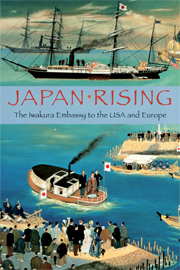Book contents
- Frontmatter
- Contents
- Introduction by Ian Nish
- Note on the Text
- VOLUME I THE UNITED STATES OF AMERICA
- VOLUME II BRITAIN
- VOLUME III CONTINENTAL EUROPE, 1
- VOLUME IV CONTINENTAL EUROPE, 2
- 61 A Survey of Russia
- 62 A Survey of Russian Railways and St. Petersburg
- 63 A Record of St. Petersburg, 1
- 64 A Record of St. Petersburg, 2
- 65 A Record of St. Petersburg, 3
- 66 A Record of Northern Germany, First Part
- 67 A Record of Denmark
- 68 A Record of Sweden, 1
- 69 A Record of Sweden, 2
- 70 A Record of Northern Germany, Second Part, 1
- 71 A Record of Northern Germany, Second Part, 2
- 72 A Record of Southern Germany
- 73 A Survey of Italy
- 74 A Record of Florence
- 75 A Record of Rome, 1
- 76 A Record of Rome, 2
- 77 A Record of Naples
- 78 A Record of Lombardy and Venice
- 79 A Survey of Austria
- 80 Travels by Rail in Austria, and a Survey of Vienna
- 81 A Record of Vienna
- VOLUME V CONTINENTAL EUROPE, 3; AND THE VOYAGE HOME
- Index
61 - A Survey of Russia
Published online by Cambridge University Press: 04 August 2010
- Frontmatter
- Contents
- Introduction by Ian Nish
- Note on the Text
- VOLUME I THE UNITED STATES OF AMERICA
- VOLUME II BRITAIN
- VOLUME III CONTINENTAL EUROPE, 1
- VOLUME IV CONTINENTAL EUROPE, 2
- 61 A Survey of Russia
- 62 A Survey of Russian Railways and St. Petersburg
- 63 A Record of St. Petersburg, 1
- 64 A Record of St. Petersburg, 2
- 65 A Record of St. Petersburg, 3
- 66 A Record of Northern Germany, First Part
- 67 A Record of Denmark
- 68 A Record of Sweden, 1
- 69 A Record of Sweden, 2
- 70 A Record of Northern Germany, Second Part, 1
- 71 A Record of Northern Germany, Second Part, 2
- 72 A Record of Southern Germany
- 73 A Survey of Italy
- 74 A Record of Florence
- 75 A Record of Rome, 1
- 76 A Record of Rome, 2
- 77 A Record of Naples
- 78 A Record of Lombardy and Venice
- 79 A Survey of Austria
- 80 Travels by Rail in Austria, and a Survey of Vienna
- 81 A Record of Vienna
- VOLUME V CONTINENTAL EUROPE, 3; AND THE VOYAGE HOME
- Index
Summary
It was in Russia that we ventured into the remotest regions in the course of our peregrinations around America and Europe. As we travelled steadily eastwards after leaving Paris, signs of civilisation became ever more sparse. Along the Baltic coast and the northern parts of Poland we saw dense forests and empty plains stretching away endlessly. In the midst of them were some miserable and humble dwellings which reminded us of the American plains, and when we opened our maps to investigate the matter, we discovered that most of the continent of Europe presents just such a prospect as this. For all the talk about civilisation and development, when the whole world is taken into consideration these notions amount to no more than the light of a star on the ground in one corner of the world. Fully 90 per cent of all dry land is still desolate.
In terms of territory Russia occupies two-thirds of Europe and almost one-half of Asia. One-seventh of the land of the entire world comes under the sway of the Russian empire. If one excludes Britain and all the territories which belong to it, Russia covers the largest area in the world. As for the population of Russia, its Asian territories consist mostly of nothing but dense forests or desolate land over which savage peoples and wild beasts roam, and its European territories are more populous than the rest of the country.
- Type
- Chapter
- Information
- Japan RisingThe Iwakura Embassy to the USA and Europe, pp. 321 - 325Publisher: Cambridge University PressPrint publication year: 2009



